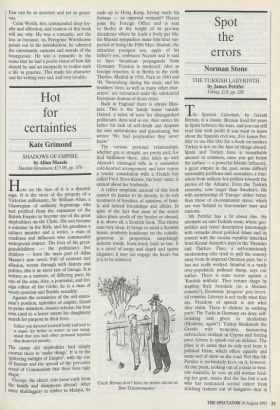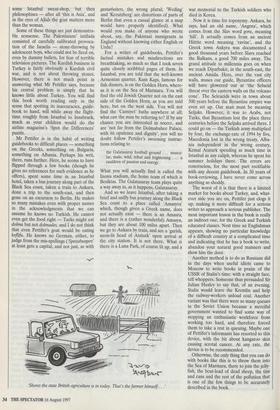Spot the errors
Norman Stone
THE TURKISH LABYRINTH by James Pettifer Viking £18, pp. 288 The Spanish Labyrinth, by Gerald Brenan, is a classic. Brenan lived for years in Spain between the wars, and you can still read him with profit if you want to know about the Spanish civil war. For James Pet- tifer to use this title for a book on modern Turkey is not on the face of things absurd. Spain and Turkey have a remarkable amount in common, once you get below the surface — a powerful Islamic influence, a great empire in the past, some difficult nationality problems and, nowadays, a tran- sition from military-led politics towards the pieties of the Atlantic. Even the Turkish economy, now larger than Sweden's, fits with membership of 'Europe' rather better than those of ex-communist states, which are way behind in free-market laws and customs.
Mr Pettifer has a fit about this. He attempts an anti-Turkish essay, where geo- politics and travel description intermingle with remarks about political Islam and its contest with the secular republic inherited from Kemal Ataturk's days in the Twenties and Thirties. Then, a self-consciously modernising elite tried to pull the country away from its imperial Ottoman past, but it has not really worked. Istanbul is a vastly over-populated, polluted dump, says our author. There is state terror against a `Kurdish intifada'. They torture chaps by stapling their foreskins (in a Moslem country?). Economic 'progress' gets invert- ed commas. Literacy is not really what they say. Freedom of speech is not what they claim. There is cholera in outlying parts. The Turks in Germany are dozy, self- isolating and given to alcoholism (Moslems, again?). Turkey blackmails the Greeks with weaponry, massacring defenceless civilians in Cyprus and forcing poor Athens to splash out on defence. The place is so awful that its only real hope is political Islam, which offers equality and some sort of show on the road. Not that Mr Pettifer is particularly keen on it, however. At one point, looking out of a train in west- ern Anatolia, he sees an old woman feed- ing her goat, muses that she has lost a son who has contracted scrotal cancer from stitching trainers out of kangaroo skin in some Istanbul sweat-shop, but then philosophises — after all 'this is Asia', and in the eyes of Allah the goat matters more than the woman.
Some of these things are just demonstra- ble nonsense. The Palestinians' intifada consisted of carefully calibrated provoca- tion of the Israelis — stone-throwing by adolescent boys, who could not be fired on, even by dummy bullets, for fear of terrible television pictures. The Kurdish business in Turkey is fairly obviously a Kurdish civil war, and is not about throwing stones. However, there is not much point in answering what Mr Pettifer says, because his central problem is simply that he knows little about Turkey. You will find this book worth reading only in the sense that spotting its inaccuracies, guide- book to hand, will while away the flight- time roughly from Istanbul to Innsbruck, much as your children would do the airline magazine's 'Spot the Differences' puzzle.
Mr Pettifer is in the habit of writing guidebooks to difficult places — something on the Greeks, something on Bulgaria, something on Albania. Perhaps his writ, there, runs further. Here, he seems to have flipped through a few books (though he gives no references for such evidence as he offers), spent some time in an Istanbul hotel, taken a bus journey along part of the Black Sea coast, taken a train to Ankara, done a trip to the south-east, and then gone on an excursion to Berlin. He makes so many mistakes even with proper names in the acknowledgments that we can assume he knows no Turkish. He cannot even get the food right — Turks might eat dolma but not dolmades, and I do not think that even Pettifer's goat would be eating keflifu. He knows no German, either, to judge from the mis-spellings (SpeiSsburgers' at least gets a capital, and not just, as with gastarbeiters, the wrong plural; Weding' and `Kreutzberg' are distortions of parts of Berlin that even a casual glance at a map would have properly identified). What would you make of anyone who wrote about, say, the Pakistani immigrants in England without knowing either English or Urdu?
For a writer of guidebooks, Pettifer's factual mistakes and misdirections are breathtaking, so much so that I took seven quite closely scribbled pages of them. In Istanbul, you are told that the well-known Armenian quarter, Kum Kapi, famous for fish dinners, is on the Golden Horn, where- as it is on the Sea of Marmara. You will find the old Jewish Quarter not on the east side of the Golden Horn, as you are told here, but on the west side. You will not find the `Cumiyef baths anywhere at all; what can the man be referring to? If by any chance you are interested in soccer, and are 'not far from the Dolmabahee Palace, with its opulence and dignity', you will no doubt follow Pettifer's swooning instruc- tions relating to
the Galatasaray football ground . . . muscu- lar, male, wild, tribal and frightening . .. a cauldron of passion and energy.
What you will actually find is called the Inonu stadium, the home team of which is Besiktas. The Galatasaray team plays quite a way away in, as it happens, Galatasaray.
And so we leave Istanbul, after taking a brief and sniffy bus journey along the Black Sea coast to a place called `Amasyra' which, though given a Greek name, does not actually exist — there is an Amasra, and there is a (rather wonderful) Amasya, but they are about 100 miles apart. Then we go to Ankara by train, and see a 'garish, neon-lit head of Ataturk' upon arrival at the city station. It is not there. What is there is a Luna Park, of course lit up, and a `Shows the state British agriculture is in today. That's the farmer himself . . war memorial to the Turkish soldiers who died in Korea.
Now it is time for toponymy. Ankara, he says, had an old name, 'Angora', which comes from the Slav word gora, meaning `hill'. It actually comes from an ancient Hittite word meaning 'ravine', and the Greek town Ankyra was documented a good thousand years before Slays reached the Balkans, a good 700 miles away. The grand attitude to millennia goes on when we reach Diyarbakir, in the south-east, the ancient Amida. Here, over the vast city walls, muses our guide, Byzantine officers will have glowered out at 'the Selucid threat over the eastern walls on the volcano cone'. The Seleucids were in town about 500 years before the Byzantine empire was even set up. Our man must be meaning Seljuks. However, it was to Arabs, not Turks, that Byzantium lost the place three centuries before the Seljuks arrived there. I could go on — the Turkish army multiplied by four, the exchange-rate of 1994 by five, Macedonia lost in the wrong treaty, Alba- nia independent in the wrong century, Kemal Ataturk spending as much time in Istanbul as any caliph, whereas he spent his summer holidays there. The errors are remorseless, for the most part rectifiable with any decent guidebook. In 30 years of book-reviewing, I have never come across anything so shoddy.
The worst of it is that there is a limited market for books about Turkey, and, what- ever side you are on, Pettifer just clogs it up, making it more difficult for a serious writer to approach a serious publisher. The most important lesson in the book is really an indirect one, for the Greek and Turkish educated classes. Next time an Englishman appears, showing no particular knowledge of a difficult country at a complicated time and indicating that he has a book to write, abandon your natural good manners and show him the door.
Another method is to do as Russians did in the days when useful idiots came to Moscow to write books in praise of the USSR of Stalin's time: with a straight face, tell whoppers. Someone thus persuaded Sir Julian Huxley to say that, of an evening, Stalin would leave the Kremlin and help the railway-workers unload coal. Another variant was that there were so many queues in the Soviet Union because a merciful government wanted to find some way of stopping an enthusiastic workforce from working too hard, and therefore forced them to take a rest in queuing. Maybe one of Pettifer's informants has resorted to this device, with the bit about kangaroo skin causing scrotal cancer. At any rate, the device is to be recommended.
Otherwise, the only thing that you can do with books like this is to throw them into the Sea of Marmara, there to join the jelly- fish, the boat-load of dead sheep, the tins and cans and the rest of the pollution that is one of the few things to be accurately described in the book.



























































 Previous page
Previous page